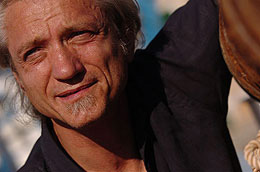|
Darko RundekInterview by Rada Djurica
With his eclectic, characteristic voice, Darko Rundek is a legend of ex-Yugoslavian rock 'N' roll from the '80s. His career started in the early '80s in the influential new age pop band Haustor. By the end of the '80s, Rundek proved himself as one of the most charismatic musicians in former Yugoslavia, and Haustor defined an entire period of ex-Yugoslavian music. Rundek's music is not easily classified. His lyrics draw on the
wildest imagination, evoking a magical world of romance or, sometimes,
of simple feelings. For many, Haustor was a pop rock band, and beyond
that, the band is well recognized for its amazing influence and great
impact on entire generations of musicians in the '80s and '90s. Once
a fan of Rundek, always a fan of Rundek! For ex-Yugoslav music fans, Rundek is often classified as post-punk
(comparable with The Cure in the U.K. or the Talking Heads in the USA).
To his audience outside the Balkans, you could say Rundek plays his
grandfather's music — not to be confused with folk music —
so naturally that it becomes complicated to classify. Himself, he claims
to be connected with ancestors. Educated as a theatre director, he has been composing for theatre,
following the cabaret tradition of Bertold Brecht in the U.K. or Ibsen
in Norway. Altogether his music today is a weird combination of musical
styles, sounds and instruments. His latest CDs represent a continued
exploration of musical theatre and post-punk-influenced sounds, and
is mainly popular in the ex-Yugoslavian countries. Today, Rundek's music is an amazing mix of extraordinary musical
improvisations that groove on inspiration from everyday things. Now
living in Paris, Rundek crafts songs in several languages. As a sensitive
writer and experienced musician, Rundek is mature enough to let his
musicians to tear apart his old compositions and reassemble them into
an entirely new song. His multicultural band expertly blends elements
of folk and rock, highlighted by Rundek's vocals. Can you define your music? My music is evolving into three main directions: songs; applied music
for theatre, dance, radio, sound design; and music improvisations. All
three directions nourish each other. So songs are often born from improvisations,
and performance or show or films that I've been working on inspire their
subjects. Applied music gives the opportunity to travel into genres
and sounds, something I otherwise wouldn't go to. Improvisation is work
toward accessibility, spaciousness and reconnecting to a natural source. Is there any difference between your music in the '80s with the ex-Yugoslavian band Haustor and nowadays? The process and interest cycle is similar to today, just like with
our '80s band called Haustor. Differences come from the differences
of a lifetime and maybe as the result of certain work on you. What inspires you most while creating? Some sudden idea. The country that likes you most? Serbia, I think. Where is your home now? In Montreuil, one of the Paris suburbs. What do you think about today's electronic music? People were always doing music from those [sounds] that were available
to them as material. Today, we are surrounded with electric and electronic
equipment, so it is natural to have electronic help. Of course, the
character of the material influences the character of the music. |
